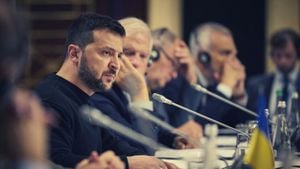South Korea has recently found itself engulfed in political turmoil as opposition lawmakers moved to impeach President Yoon Suk Yeol, igniting widespread protests and intense debates about his controversial declaration of martial law. On the night of December 3, 2024, President Yoon made headlines when he surprised the nation by announcing martial law, only to overturn it just six hours later. Critics swiftly labeled his actions as unconstitutional and politically motivated, primarily aimed at evading scrutiny amid rising allegations of misconduct involving him and his family.
During a surprise televised address, President Yoon claimed he was compelled to impose martial law to protect the nation from North Korean threats and alleged meddling from opposition parties. He accused the Democratic Party and its allies of “paralyzing” his administration and undermining the constitutional order. His declaration led to immediate legislative chaos, with opposition lawmakers reportedly tussling with military personnel to gain entry to the National Assembly to annul the order, which they deemed tyrannical.
Average citizens and political commentators alike expressed disbelief at the rapid escalation of events. Within minutes of Yoon’s announcement, approximately 190 lawmakers—among them members from his own People Power Party (PPP)—gathered at the National Assembly, leading to confrontations with up to 300 military personnel deployed to enforce the order. The assembly was eventually able to vote unanimously to lift martial law before morning, marking the incident as the first of its kind since the 1980s military regimes.
South Korea’s Constitution requires impeachment to be supported by two-thirds of the 300-member National Assembly, meaning the Democratic Party must garner support from Yoon's governing party to proceed with the motion effectively. With the Democratic Party holding 170 seats, they need at least eight votes from the PPP to initiate impeachment proceedings. "This is an unforgivable crime – one which cannot, should not, and will not be pardoned," said MP Kim Seung-won, encapsulating the sentiment swirling around the impeachment push.
Yoon’s martial law declaration not only suspended legislative operations but also restricted public gatherings and put media under governmental control, which alarmed many who lived through the authoritarian years of South Korean history. Critics like Greg Scarlatoiu, president of the Committee for Human Rights in North Korea, described the declaration as largely frivolous, stating, "The fact the parliament rejected martial law by such overwhelming margins shows the president had overreached." Meanwhile, Korea's trade unions called for strikes and rallies demanding Yoon's resignation.
Pressure has mounted not only on President Yoon but also on several members of his cabinet, including Defense Minister Kim Yong-hyun, who resigned but insisted all responsibility for the martial law declaration lay with Yoon. Impeachment articles were officially proposed by the opposition, which aim to hold Yoon accountable for alleged constitutional violations. If impeachment proceeds and is successful, Yoon will temporarily lose his presidential authority pending the Constitutional Court’s ruling.
The swift backlash against Yoon’s actions showcases the divisive sentiment within South Korean society. Many citizens who have benefitted from decades of democratic governance are wary of any moves perceived as reminiscent of past military rule. Political experts highlighted Yoon's declining popularity, which has recently dipped under 20%, amid scandals surrounding himself and his wife involving luxury gifts and alleged influence peddling.
"The South Korean people recognize the signs and are unwilling to accept what appears to be backsliding toward authoritarianism," noted Benjamin Engel, a political science professor. With protests gaining momentum across the country, civil groups planned large-scale demonstrations urging the president’s removal, signaling the sustained public outcry.
If Yoon’s impeachment fails, it could embolden his administration, but with resignations sprouting across key government posts, including the Chief of Staff, concerns grow over the stability of his leadership. Prime Minister Han Duck-soo stated intentions to navigate the government through this crisis, asserting, “We must remain united to restore stability.” He echoed the sentiment shared by many politicians and citizens alike, encouraging dialogue and cooperation rather than conflict.
Yoon's handling of the situation has drawn criticism from both domestic and international fronts, with U.S. Secretary of State Antony Blinken commenting on the importance of resolving political disputes peacefully under the rule of law. Analysts believe Yoon's fate will be determined by his ability to forge alliances and navigate the fallout from the martial law controversy. The opposition’s strategy to accuse Yoon of insurrection complicates his path back to stability, as more calls for accountability rise.
Political commentators reflect on the future of this situation with uncertainty, emphasizing the precarious constitutionality of Yoon's methods. With the atmosphere around him growing increasingly chaotic, questions remain about whether he can recuperate his standing or if his administration will unravel under mounting pressure.
This recent chapter of South Korea’s political scene has ignited fervent discussion about leadership, governance, and the limits of presidential powers. A vote on the impeachment motion may occur as early as Friday, propelling the nation toward what might be one of its most consequential political confrontations since returning to democratic rule. All eyes are now on the National Assembly as the situation continues to evolve on unprecedented grounds.



